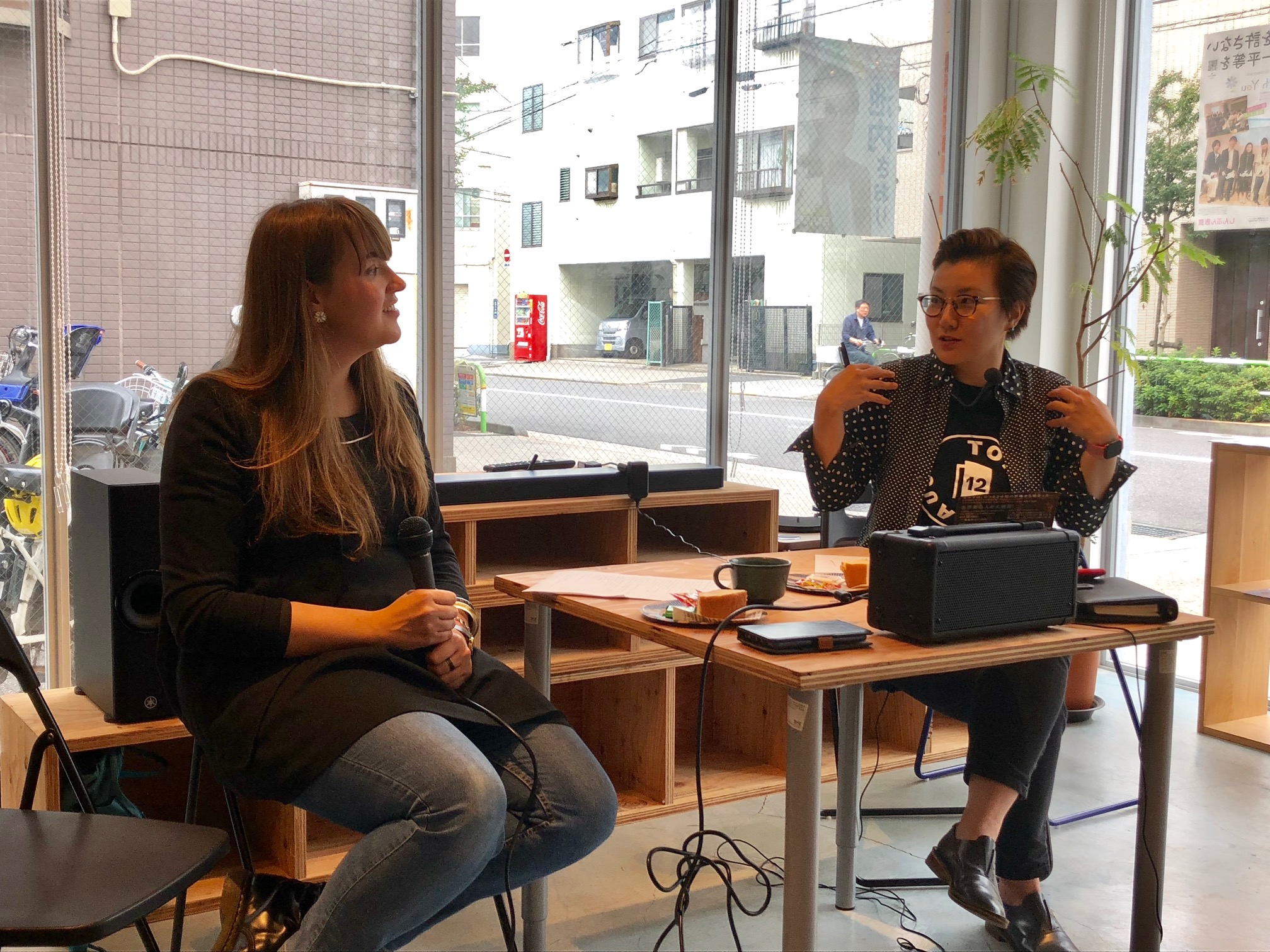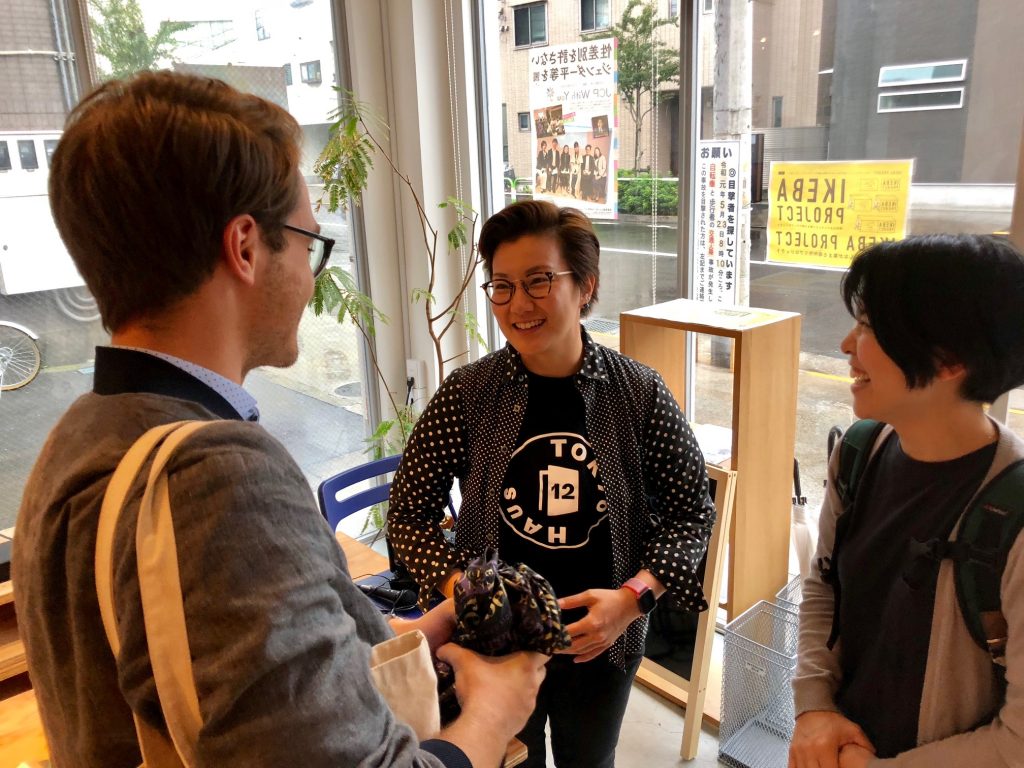2019-06-19
The differences between Japan and Germany ―A workshop with the guest from Germany
This is a report about the workshop. It was written by Saori Ikeuchi , and translated by her friend Rika. Please read it!
——————————————————————————————————
On June 9th me and my friend Rika from Germany held a talk event at my office in Kita ward.

When Rika was 7 years old, she started to watch the Anime “Sailor Moon” and developed an interest for Japan because of her love for Japanese pop culture. When she came to Japan the first time she was a high school student and joined an exchange student program. Later she went back to Germany to graduate German university. Her friends asked her “Why didn’t you study at a Japanese university when you already can speak Japanese?” Her answer was simple: “Japanese university fees are too expensive.” After graduating Potsdam university she came back to Japan and is living and working here now for 5 years.
However, living in Japan wasn’t always just enjoyable and easy. She experienced discrimination because of being a foreigner in Japan. And not only by Japanese. While working as a teacher at an English conversation school, she found out, that English native speakers are getting a higher payment than her. While doing the same work, working the same hours, native English speakers got a higher salary. She found out about it while talking to an English friend.
Another thing which surprised her was the Japanese health system. Not only that the monthly payment of the Japanese health insurance is very expensive, when being sick she always needs to pay at the hospital 30% of the examination cost as well as paying again at the drug store for the medicine the doctor subscribed. In Germany she didn’t need to bring cash when going to the doctor. Most treatments are fully covered by her health insurance. She also claimed “When going to the hospital or the doctor I never needed to bring my wallet with cash. The health insurance card was enough.” When she first had to go to a Japanese hospital she didn’t know how much the examination by the doctor will cost and also that she couldn’t use her credit card. So she just brought around 30,000 Yen, not knowing that so much wouldn’t be needed. She was also surprised about how much medicine Japanese doctors give and that she couldn’t understand why she had to take so many pills at once.
Even with only a cold usually German people don’t take a lot of medicine, they just drink a lot of water or tea and stay in bed, sometimes even a week. What surprised her in Japan was, that most people just take a lot of medicine and go back to work straight the other day, even they still feel a bit weak from their cold or other sicknesses.
Another German friend attended the our event, Lewis, who claimed that Japanese people not really speak about politics. “It’s not that we want to offend someone when talking about politics, but we want to make a change. But if you don’t discuss things, of course change won’t happen.” he said and Rika agreed with him.
For Rika meeting with people from the Japanese Communist party really meant giving her hope again. “They understand my feelings. But friends or co-workers always tell me to be careful with being political or supporting the JCP. For me it is natural to learn about the policy and program of a political party and when I support a political party I have the responsibility to know about its members and the history.”
My answer to that was “The Japanese communist party was always strictly criticized by Mao Zedong and Stalin. Moreover we are the only communist party in the world, which at the time of the collapse of the Soviet Union tried to help the suppressed people of the supremacy with socialist signs. The JCP will always welcome you.”
“And this is why I support you.” was Rikas answer.
Rika was born in East Germany, shortly before the collapse of the former GDR. She even brought her mother-child-notebook (which is a very uncomfortable noun for me to use) which she received at the time of her birth from the hospital. The other day I saw the German movie “The Silent Revolution” (2018) which took place in the German city of Stalinstadt. Stalinstadt which is now called “Eisenhüttenstadt” was the city where Rikas high school was located. After the fall of the Berlin wall the name of the city has changed.
After WWII the purpose of the German education was to “nurture individuals who can say their opinion even if this will exclude them from a community.” In order to set up such a philosophy there were extraordinary efforts and struggles by citizens necessary and probably this is why Rika and Lewis are now individuals who say “I have an idea and my own opinion but I can respect the difference and your position.”
Both of them gave me the feeling of helping to create a society which has a standard of exchanging different opinions.
What I felt strongly from this talk was that in Germany gender equality and human rights are present in every small corner of the German society. It goes without saying that of course it is still not perfect. But Rika told me in front of schools and nursery schools cars cannot pass or have to slow down to 30 km. School tuition fee is free, also for Universities, not depending on your nationality. University names do not matter, but your graduation and your skill does. The opinion and abilities of a human matter.
When I asked “Why are you able to participate in politics in Germany so much and how can you create a civil society with high awareness of environmental issues?”
“I think because of our history.” Rika said. “Germany feels a big responsibility about war time and the crimes of the Nazis. We also feel a responsibility of putting a strain on other countries’ development. I was very surprised when I came to Japan and met Japanese people saying that Japan hasn’t done anything bad or wrong during World War II and that it was all Koreas fault.”
But when you trace sources back you will find out that South and North Koreans division was caused by Japan’s aggression wars. I wonder how many Japanese people are aware of that and can face the current challenges? I think schools fail to teach Japanese war crimes properly to the younger generation and even I was not aware of the gap in recognition of Northeast Asia. We spend all history class on Neanderthals but not on modern times. School doesn’t teach that. After all we are living now in an overlap of history and that’s why Article 9 of the Constitution needs to be protected and we need to promote diplomacy.
Rika and Lewis both said that from their view Article 9 of the Constitution is something great which needs to be protected. They cannot understand why someone would ever want to change it.
“There is no need to change it.”

After 2 1/2 hours the talk event was finally at an end. After receiving many questions and talking a bit more I felt that this event could have been best described with the two words “human rights”. Respecting each others countries and culture and trying to learn from each other. This is something Japanese society also needs. This is something Japanese politics needs. This is something I learned from this talk session.
Thank you very much.
